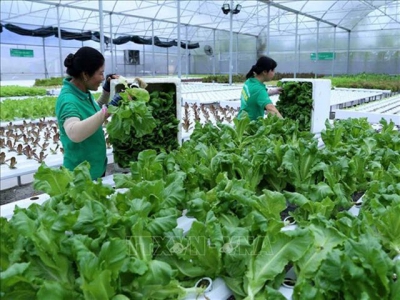Mekong Delta city seeks to use advanced farming technologies

Ho Chi Minh City — Advanced technologies hold the key to Cần Thơ’s agricultural sector raising the quality and competitiveness of its products and expand exports, experts have said.
Vegetables are grown using hydroponics at the Minh Hòa farm in Cần Thơ City’s Bình Thủy District. VNA/VNS Photo Vũ Sinh
Application of technology resulted in a 30 per cent boost to the value of agricultural produce, director of the science and Technology Application Centre run by the city Department of Science and Technology, Nguyễn Thị Tố Uyên, said.
In fact, across the country, the adoption of technology in agriculture had increased rapidly, she told a workshop held in Cần Thơ City last Friday.
City authorities should offer incentives to farmers to adopt advanced technologies and new varieties of plants and livestock, she said.
Supply chain management for agricultural products along with technology helped trace product origins from farm to table, she said.
It also helped Vietnamese farm produce enter many demanding markets, she added.
Phạm Thị Lý of the Việt Nam Association of Small and Medium Enterprises’ Integration and Development Centre for Enterprises said the application of electronic traceability systems enabled tracing product origins using barcodes on smart phones.
Hoàng Đắc Hiệt of the Research and Development Centre for High Technology Agriculture in HCM City spoke about organic leafy vegetable farming.
Organic farming, which is becoming popular, seeks to produce foods that are free of pesticides and fertilisers and genetically modified organisms, he said.
The workshop, organised by the Cần Thơ Department of Science and Technology, sought to promote the use of technology and technology transfer in agriculture.
Có thể bạn quan tâm
 Researchers making protein-rich yeast biomass ‘out of thin air’
Researchers making protein-rich yeast biomass ‘out of thin air’ A yeast biomass based on CO2 and other non-fossil resources could be commercially available by early 2021, giving the feed industry a ‘carbon-neutral’ protein
 Farmers suffer as chicken prices drop to 10-year low
Farmers suffer as chicken prices drop to 10-year low Farmers are hit hard as chicken prices drop to 10-year low in southern Vietnam, with the African swine fever prompting a livestock switch.
 Vietnam’s agricultural processing sector remains at modest level
Vietnam’s agricultural processing sector remains at modest level Technologies used in the processing sector is at a modest level compared to regional peers and the world, many of which have not been upgraded in 15 years